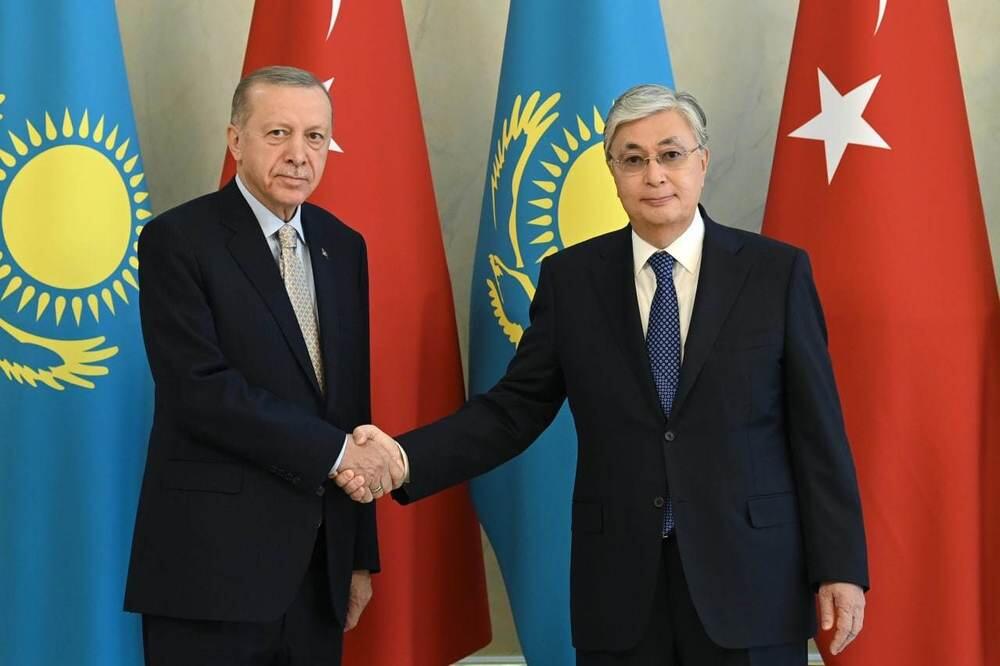BAKU, Azerbaijan, July 30. President Kassym-Jomart Tokayev’s official visit to Türkiye and his participation in the fifth session of the High-Level Strategic Cooperation Council between Kazakhstan and Türkiye were a feather in the cap for bilateral relations. In the midst of a stormy geopolitical sea, the blossoming relationship between Astana and Ankara is not just a matter of striking while the iron is hot for economic gain, but also speaks to a deeper game afoot—rooted in a shared cultural tapestry and a united front in foreign policy endeavors.
A central element of the visit was the affirmation of a robust political dialogue and closer foreign policy alignment. The two leaders emphasized the importance of peaceful conflict resolution and expressed support for reforming the global governance system.
Tokayev underscored strategic initiatives aimed at enhancing synergies within the framework of the Organization of Turkic States.
“Kazakhstan stands for the preservation of territorial integrity for all countries. Kazakhstan and Türkiye will continue effective cooperation on the international stage,” he stated.
Expanding Economic Cooperation and New Agreements
The discussions focused heavily on trade and export cooperation. A Joint Declaration was signed, along with 18 new intergovernmental agreements, expanding the existing legal framework of over 60 documents and laying the groundwork for broader Turkic integration. These agreements pave the way for real possibilities for collaborative ventures in vital sectors, including digitalization, logistics, energy, medicines, and agriculture. Türkiye also expressed interest in investing in Kazakhstan’s energy sector, including in new infrastructure to address power shortages.
President Erdoğan characterized the discussions as “productive” and underscored the pivotal significance of the economic collaboration.
“Kazakhstan is the largest economy in the region and our main trading partner. We discussed a wide range of topics—from defense and energy to transportation, science, and technology. We also explored cooperation in rare earth mineral extraction, expanding Kazakh oil exports via Türkiye, and developing the Trans-Caspian transport route—a modern Silk Road alternative,” he articulated.
Bilateral Trade: Structure and Trends
Türkiye has been in the thick of it as one of Kazakhstan’s top ten trading partners, with nearly two-thirds of their trade pie made up of Kazakh exports—mainly oil, non-ferrous metals, and agricultural goodies. It is the leading buyer of Kazakh lentils, refined copper, and polypropylene.
In the initial quintile of 2025, Kazakhstan's outbound trade to Türkiye experienced a notable uptick of over 1.5 percent, culminating in a total valuation of $1.3 billion during the January to May timeframe. Concurrently, the import metrics from Türkiye experienced a decline of approximately 15 percent, with Kazakhstan predominantly acquiring pharmaceuticals, textiles, automotive components, and Helianthus annuus seeds. By the conclusion of 2024, Türkiye emerged as Kazakhstan’s fourth-largest trading ally, with cumulative trade volumes attaining $5 billion.
Investments and Major Industry Players
Turkish investment in Kazakhstan is in the ballpark of $5.8 billion, covering a wide array of sectors like manufacturing, energy, transport, agriculture, and infrastructure. Notable investors include Coca-Cola Icecek, Aksa Energy, and Yildirim Group. Kazakhstan has also been investing in Türkiye: in 2025, Kaspi.kz acquired a controlling stake in the e-commerce platform Hepsiburada for $1.1 billion and is participating in tourism projects along the Aegean coast.
The 18 newly executed accords serve to further entrench the collaborative framework and validate the mutual dedication to sustained synergistic engagement.
Logistics and Energy: New Routes and Joint Projects
Tokayev and Erdoğan also explored prospects for deeper transport integration. Kazakhstan is putting its best foot forward in developing the Trans-Caspian International Transport Route, which connects the dots between China, Kazakhstan, the Caspian Sea, Azerbaijan, Georgia, and Türkiye—an increasingly crucial lifeline as traditional routes through Russia face the heat of disruption.
Tokayev threw out the welcome mat for Ankara to roll up its sleeves and dive into the logistics development game.
“We are modernizing railways, building roads, and upgrading Caspian port infrastructure. We invite Turkish companies to participate in these projects,” he said.
Discussions also included increasing exports of Kazakh oil through the Baku-Tbilisi-Ceyhan pipeline. As Türkiye steps into the limelight as an energy hub, this route could prove to be a sturdy lifeboat in the ever-changing tides of the global energy scene.
Astana–Ankara Axis: Integration Through Action
Consistent high-ranking delegations and synergistic
collaboration within the Organization of Turkic States facilitate
not merely political unity but also substantive advancements on
pivotal strategic initiatives. Tokayev’s visit underscored
Kazakhstan’s strategic commitment to spearheading Turkic
integration and fostering multilateral collaboration.
Strategic imperatives encompass the execution of the “Turkic Vision
2040,” the inception of the Turkic Investment Fund, and the
enhancement of logistical frameworks exemplified by the
Trans-Caspian corridor. The initiatives reinforce the Astana–Ankara
nexus—anchored in cultural synergies yet progressive in vision,
focused on mutual capital infusion, energy symbiosis, technological
synergy, and harmonized geopolitical strategies.
The visit was a breath of fresh air, marking a turning point in bilateral ties as both sides rolled up their sleeves to put major initiatives into action and strengthen their cooperation. The agreements signed underscore not only strong political trust but also growing mutual interest in building sustainable economic linkages—including industrial collaboration, energy infrastructure development, and mutual investments. The focus is not on declarations but on launching concrete mechanisms through both bilateral and multilateral Turkic platforms.
Kazakhstan and Türkiye are systematically constructing a collaborative framework that harmonizes sovereign priorities, regional objectives, and international aspirations. The prioritization of optimizing supply chain dynamics, aligning geopolitical strategies, and propelling technological innovation renders this partnership fundamentally strategic rather than merely transactional. Tokayev’s visit transcended mere diplomatic niceties, serving as a definitive indicator of Kazakhstan’s strategic ambition to engage as a proactive co-architect in the reconfiguration of the global order—fortifying alliances with pivotal stakeholders, with Türkiye now unequivocally positioned within that framework.







